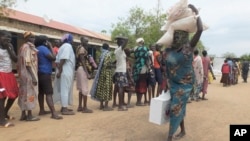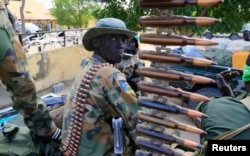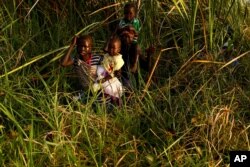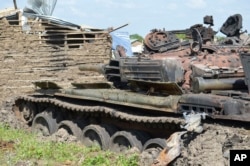Ending the conflict in South Sudan and preventing more famine there are entwined, but the situation only grows more complex as aid agencies struggle to deliver emergency food and other assistance to places where armed groups make travel dangerous.
"We have a much more chaotic situation on the ground than, let's say, two years ago, when we had one government, one armed opposition," said Casie Copeland, senior analyst at the International Crisis Group.
Copeland says there now are dozens of armed opposition groups in South Sudan.
"A handful of them are able to engage the government in pitched battles," said Copeland. "Others simply don't have any means to actually fight the government, so the most they can do are things like road ambushes of government convoys and things like that. But at the same time, of course, that means road ambushes of anyone, and then a situation of rebellion can easily start to look like general banditry and insecurity."
Chaos abounds
The confusion is not limited to the opposition. Allied militia also operate on the government side. Witnesses to recent attacks on civilians in Wau and Equatoria have said the attackers were men in uniform.
Sometimes, it is not clear whether they are soldiers, militia or rebels.
Steve McDonald, global fellow at the Washington-based Woodrow Wilson International Center for Scholars, says the groups have been able to multiply because of the chaos.
"The breakdown of governance and the ongoing fighting between the SPLA [Sudan People's Liberation Army] and the SPLA-IO [In-Opposition], Riek Machar's group, has basically destroyed any control in the countryside, so other armed groups, both clan-based and tribally-based, probably some individual bandit groups, have gotten active again because there's nothing to stop them from being active," said McDonald.
Ken Isaacs is vice president of programs and government relations at U.S.-based charity Samaritan's Purse, whose staff members were briefly held captive in March in Mayendit — one of two counties in Unity State where the U.N. has declared a famine.
"We had, several weeks ago, some people that were abducted in Mayendit, right in the middle of the famine area, and the people that took them were an off-shoot of one of the armed sides, and they were acting unilaterally of their own volition, so they didn't have orders," Isaacs said. "They just thought that was a good thing to do, to go abduct these guys."
The violence has a ripple effect. Take Equatoria, for example. Copeland calls it the "food belt" of South Sudan, a key breadbasket and transit point. She says fighting there has cut off food supplies to other parts of the country.
Leadership faulted
The chaos has made it even harder for aid agencies to operate. The U.N. said Wednesday the conflict has killed 82 aid workers and displaced 3.5 million people since it began in December 2013.
The U.N. repeatedly has warned about a looming genocide in South Sudan, but Copeland cautions against calling this an "ethnic" conflict, pitting President Salva Kiir's Dinka tribe against that of former vice president and opposition leader Machar's Nuer.
"When we look at the transitional government, what we don't see is what a lot of people say, that it is sort of a Dinka domination," Copeland said. "Actually, we find ministers from Equatoria — the national security minister is an Equatorian — we find senior Nuer in several different key ministries. So we do see that calling it an 'ethnic' conflict, or as some would say, 'tribal,' is too simplistic, actually. Even what we're seeing now, some of the worst cases in southern Unity State, where the famine is, we're seeing quite a lot of fighting even within Nuer communities, so yes, ethnicity is absolutely an important part of it, but it actually won't give you the whole story."
Weber State University economics professor and African governance expert John Mukum Mbaku says that South Sudan's political leaders on both sides are to blame for the situation.
"These are highly educated people," said Mbaku. "These are people who understand the consequences of violence and yet, they are still not willing to sit down and try to prevent this violence from taking place. And I think that if they don't do something about it, history will remember them, not as nationalists who tried to develop a country, but as monsters who were specifically interested only in their own personal interests."
J. Peter Pham, vice president of the Atlantic Council and director of its Africa Center, also faults South Sudan's political leadership, saying that it has squandered the international goodwill it received upon its country's independence in 2011.
"Sustainably, we're not going to get out of this crisis until we have a change in leadership and we have a new leadership who put the interests of their people ahead of themselves," Pham said.
Violence against civilians has escalated since the breakdown of the 2015 peace deal. The U.N. and the government have projected that by July, roughly half of the country will be severely food insecure.







